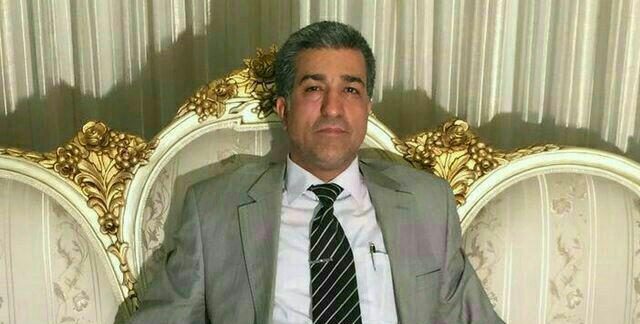Former Basij Paramilitary Member Sentenced to 13 Years for Creating Online Group

Kamal Jafari Yazdi Had a Change of Heart After the 2009 Protests
Kamal Jafari Yazdi, a former staunch supporter of the Iranian government, has been sentenced to 13 years imprisonment by a preliminary court for his social media activities, he informed the Center for Human Rights in Iran (CHRI) on April 19, 2019.
An unnamed judge at Branch 4 of the Revolutionary Court in the northeastern city of Mashhad sentenced him to 10 years in prison for the charges of “forming an illegal group against national security,” two years for “insulting the supreme leader,” and one year for “propaganda against the state.”
The verdict was issued on April 16. If upheld by the Appeals Court, he would have to serve a minimum of 10 years based on Article 134 of Iran’s Islamic Penal Code.
“I had created a group [translates to ‘My Iran’ on] Telegram where I posted various things like poetry and cultural and social things as well as occasional political criticism. Sometimes I also shared news about political prisoners,” Yazdi said.
“The group was public and unfortunately, I didn’t know most of the members,” he added. “Now they have given me a 10-year prison sentence for creating a so-called illegal group.”
Iranian law allows courts to sentence citizens to prison for the simple act of creating online groups, pages or channels, as well as for their personal online posts.
Article 498 of the Islamic Penal Code states, “Anyone, with any ideology, who establishes or directs a group, society, or branch inside or outside the country, with any name or title, that constitutes more than two individuals and aims to perturb the security of the country, if not considered as mohareb, shall be sentenced to two to ten years imprisonment.”
“Mohareb” means “waging war against God.”
Yazdi, 53, said his trial, held on April 9, 2019, seemed to be going in his favor until it became clear that the Intelligence Ministry had dictated his sentence in advance.
“The proceedings were going well and the judge was almost sympathetic to my defense,” he said. “I couldn’t imagine he would issue such a heavy sentence. In his verdict, the judge even wrote that my criticism was well-intentioned.”
“But in the concluding six lines I was condemned to 13 years in prison without any reason,” Yazdi added. “That made it clear that the verdict had been dictated to the judge by the Intelligence Ministry.”
A retired university professor who taught strategic management, Yazdi was working as an adviser to commercial industrial companies in Iran when agents of the Intelligence Ministry in Mashhad arrested him on July 24, 2018. He was released on bail three months later.
Yazdi said he used to be a loyal supporter of the Islamic Republic as a member of the Basij paramilitary volunteer force, under the command of the Islamic Revolutionary Guard Corps. But the state’s violent suppression of pro-democracy demonstrations after the controversial 2009 presidential election had a profound impact on him.
“I was a supporter of the Islamic Republic and for years I fought in the (Iran-Iraq) War,” he told CHRI. “I was injured and my brother was martyred in the war… But I became a critic of the regime after 2009 because of the suppression of the people and the killing of young protesters in Kahrizak.”
Three young men, Mohsen Rouholamini, Mohammad Kamrani, and Amir Javadifar died after being tortured in the Kahrizak Detention Center five days after they were arrested on July 10, 2009.
They were among approximately 150 protesters who were detained that day for participating in peaceful protests in Tehran against the disputed result of the 2009 presidential election.
The leaders of those protests—Mehdi Karroubi, Mir Hossein Mousavi, and Zahra Rahnavard—have been under extrajudicial house arrest since February 2011.






